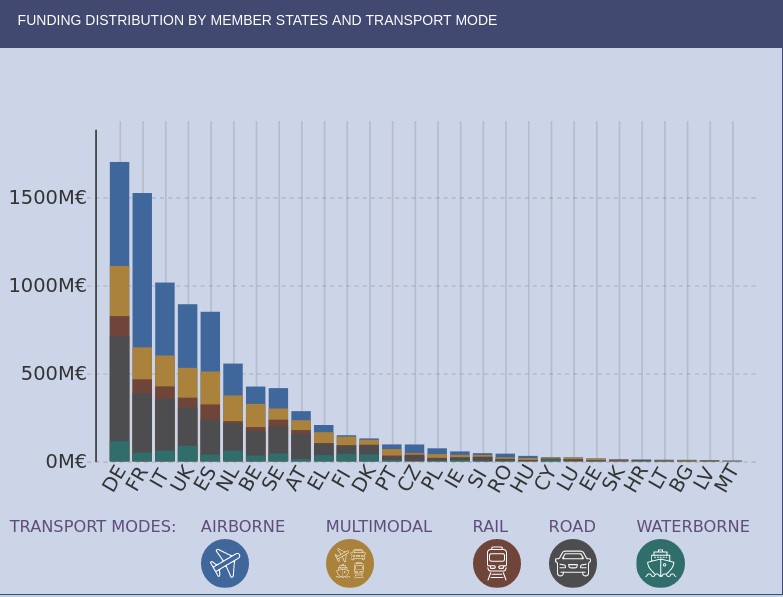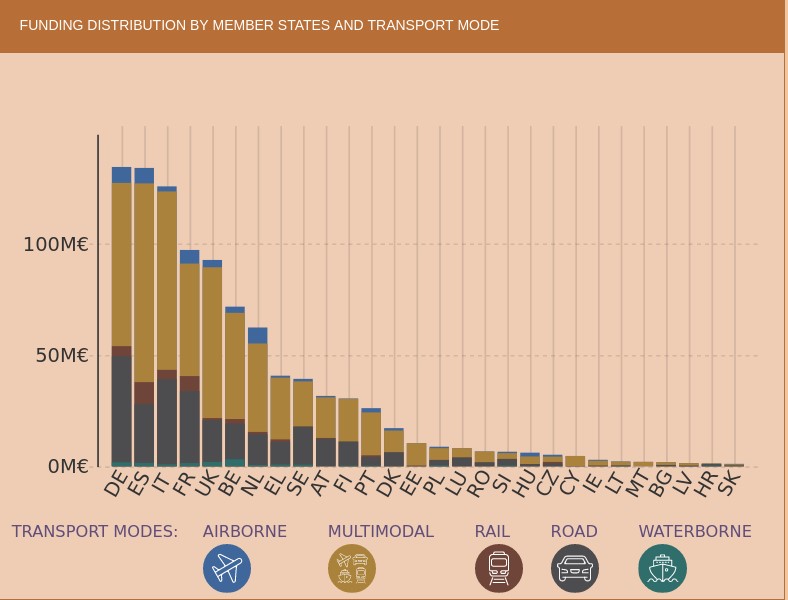
Open data portals are experiencing a significant growth in the number of datasets being published in the transport and mobility category. For example, the EU's open data portal already has almost 48,000 datasets in the transport category or Spain's own portal datos.gob.es, which has around 2,000 datasets if we include those in the public sector category. One of the main reasons for the growth in the publication of transport-related data is the existence of three directives that aim to maximise the re-use of datasets in the area. The PSI directive on the re-use of public sector information in combination with the INSPIRE directive on spatial information infrastructure and the ITS directive on the implementation of intelligent transport systems, together with other legislative developments, make it increasingly difficult to justify keeping transport and mobility data closed.
In this sense, in Spain, Law 37/2007, as amended in November 2021, adds the obligation to publish open data to commercial companies belonging to the institutional public sector that act as airlines. This goes a step further than the more frequent obligations with regard to data on public passenger transport services by rail and road.
In addition, open data is at the heart of smart, connected and environmentally friendly mobility strategies, both in the case of the Spanish "es.movilidad" strategy and in the case of the sustainable mobility strategy proposed by the European Commission. In both cases, open data has been introduced as one of the key innovation vectors in the digital transformation of the sector to contribute to the achievement of the objectives of improving the quality of life of citizens and protecting the environment.
However, much less is said about the importance and necessity of open data during the research phase, which then leads to the innovations we all enjoy. And without this stage in which researchers work to acquire a better understanding of the functioning of the transport and mobility dynamics of which we are all a part, and in which open data plays a fundamental role, it would not be possible to obtain relevant innovations or well-informed public policies. In this sense, we are going to review two very relevant initiatives in which coordinated multi-national efforts are being made in the field of mobility and transport research.
The information and monitoring system for transport research and innovation
At the European level, the EU also strongly supports research and innovation in transport, aware that it needs to adapt to global realities such as climate change and digitalisation. The Strategic Transport Research and Innovation Agenda (STRIA) describes what the EU is doing to accelerate the research and innovation needed to radically change transport by supporting priorities such as electrification, connected and automated transport or smart mobility.
In this sense, the Transport Research and Innovation Monitoring and Information System (TRIMIS) is the tool maintained by the European Commission to provide open access information on research and innovation (R&I) in transport and was launched with the mission to support the formulation of public policies in the field of transport and mobility.
TRIMIS maintains an up-to-date dashboard to visualise data on transport research and innovation and provides an overview and detailed data on the funding and organisations involved in this research. The information can be filtered by the seven STRIA priorities and also includes data on the innovation capacity of the transport sector.
If we look at the geographical distribution of research funds provided by TRIMIS, we see that Spain appears in fifth place, far behind Germany and France. The transport systems in which the greatest effort is being made are road and air transport, beneficiaries of more than half of the total effort.

However, we find that in the strategic area of Smart Mobility and Services (SMO), which are evaluated in terms of their contribution to the overall sustainability of the energy and transport system, Spain is leading the research effort at the same level as Germany. It should also be noted that the effort being made in Spain in terms of multimodal transport is higher than in other countries.

As an example of the research effort being carried out in Spain, we have the pilot dataset to implement semantic capabilities on traffic incident information related to safety on the Spanish state road network, except for the Basque Country and Catalonia, which is published by the General Directorate of Traffic and which uses an ontology to represent traffic incidents developed by the University of Valencia.
The area of intelligent mobility systems and services aims to contribute to the decarbonisation of the European transport sector and its main priorities include the development of systems that connect urban and rural mobility services and promote modal shift, sustainable land use, travel demand sufficiency and active and light travel modes; the development of mobility data management solutions and public digital infrastructure with fair access or the implementation of intermodality, interoperability and sectoral coupling.
The 100 mobility questions initiative
The 100 Questions Initiative, launched by The Govlab in collaboration with Schmidt Futures, aims to identify the world's 100 most important questions in a number of domains critical to the future of humanity, such as gender, migration or air quality.
One of these domains is dedicated precisely to transport and urban mobility and aims to identify questions where data and data science have great potential to provide answers that will help drive major advances in knowledge and innovation on the most important public dilemmas and the most serious problems that need to be solved.
In accordance with the methodology used, the initiative completed the fourth stage on 28 July, in which the general public voted to decide on the final 10 questions to be addressed. The initial 48 questions were proposed by a group of mobility experts and data scientists and are designed to be data-driven and planned to have a transformative impact on urban mobility policies if they can be solved.
In the next stage, the GovLab working group will identify which datasets could provide answers to the selected questions, some as complex as "where do commuters want to go but really can't and what are the reasons why they can't reach their destination easily?" or "how can we incentivise people to make trips by sustainable modes, such as walking, cycling and/or public transport, rather than personal motor vehicles?"
Other questions relate to the difficulties encountered by reusers and have been frequently highlighted in research articles such as "Open Transport Data for maximising reuse in multimodal route": "How can transport/mobility data collected with devices such as smartphones be shared and made available to researchers, urban planners and policy makers?"
In some cases it is foreseeable that the datasets needed to answer the questions may not be available or may belong to private companies, so an attempt will also be made to define what new datasets should be generated to help fill the gaps identified. The ultimate goal is to provide a clear definition of the data requirements to answer the questions and to facilitate the formation of data collaborations that will contribute to progress towards these answers.
Ultimately, changes in the way we use transport and lifestyles, such as the use of smartphones, mobile web applications and social media, together with the trend towards renting rather than owning a particular mode of transport, have opened up new avenues towards sustainable mobility and enormous possibilities in the analysis and research of the data captured by these applications.
Global initiatives to coordinate research efforts are therefore essential as cities need solid knowledge bases to draw on for effective policy decisions on urban development, clean transport, equal access to economic opportunities and quality of life in urban centres. We must not forget that all this knowledge is also key to proper prioritisation so that we can make the best use of the scarce public resources that are usually available to meet the challenges.
Content written by Jose Luis Marín, Senior Consultant in Data, Strategy, Innovation & Digitalization.
The contents and views reflected in this publication are the sole responsibility of the author.